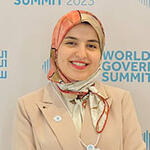Blog
What are foresight methods and how can they secure our common futures?
Future tools and foresight thinking are crucial instruments to improve decision-making for a common future. As a Youth Foresight Fellow with UNICEF, I firmly believe that utilizing foresight, a sophisticated approach for anticipation and strategic planning, is essential in tackling and lessening the impacts of climate change, conflict, and inequality.
Foresight allows us to think about the speculated future based on models and data to solve problems and chart a path to a prosperous and nurturing society for future generations. During the WIDER Development Conference in Maputo, I will explore the role that consensus in international governance and policy can play in those solutions and in future prosperity.
Shaping the future—harnessing foresight for sustainable development
The foresight process involves observing emerging trends, understanding their potential impacts, and generating powerful ideas to address unmet needs. This approach is essential to understand how climate change, conflict, and inequality will affect the unborn children of future generations.
By examining the past, we can develop change plans that anticipate and address future security issues and shifts in social values. For example, my work involves using weather models to interpret the effects of climate change on farmers in North Africa. By understanding these impacts, we can develop agricultural programmes that not only adapt to climate change, but also ensure food security and reduce subsequent conflict.
Vision-driven programmes are excellent for promoting sustainable growth. Another example creates designated innovation zones for developing and testing modern technologies in real-world environments. These zones serve as incubators for leadership in areas such as renewable energy, sustainable agriculture, and waste management. They advance green technologies and support primary job creation and education.
Another new approach is the establishment of Universal Basic Access (UBA) which means that all persons can access digital, physical, and financial opportunities, a worthwhile objective in its own right which also ensures greater personal safety and productivity. The UBA approach recognizes that addressing inequality extends beyond income disparities to include a future with equitable access to income sources, that is, individuals’ ability to benefit from and contribute to society.
Interdisciplinary collaboration—the case of green Algeria
The possibility of interdisciplinary collaboration to ensure a better future is illustrated by my work in Algeria, where some regions face challenges from climate change, conflict, and inequality. The Project is a collaboration with environmental scientists, economists, problem-solvers, and community leaders which focuses on sustainable land management to prevent desertification, a major environmental problem.
A critical component of project conception was recognizing that the combination of desertification and climate change may have disastrous consequences for Algerian livelihoods. Recognition of a potential future, from analysis of trends and using foresight tools led to a project design built around altering future outcomes.
The operation uses satellite imagery and ground data to identify degraded land and subsequently implement suitable interventions, such as land rehabilitation, soil fertility enhancement, and water conservation. Additional actions include community initiatives, like microcredit projects, and educational programmes to increase awareness about survival farming, support the project’s goals and promote more sustainable farming practices.
The partnership is not just about environmental damage, it also promotes profitable exchange and reduces the potential for conflict by diminishing competition for natural resources. The combination of foresight with interdisciplinary collaboration provides a solid foundation for an in- depth exploration of complex issues and improved initiatives.
By anticipating future trends and creating collaborative projects, we can solve problems interactively and make our ideas meaningful and affordable. Foresight strategies such as integrating a vision of the future into projects and promoting new normative values—such as support for green spaces to prioritize sustainability, and engagement with multilateralism and international processes to recognize a common global humanity—can help identify what we need to change today.
As we discuss critical development issues at the WIDER Development Conference, I hope to champion the use of foresight and collaboration as essential tools to shape a more sustainable future. The importance of these tools cannot be underestimated. They allow us to imagine and create an equal future for all. Join me in advocating for these ideas for change. Together we can leave prosperity and peace behind for future generations.
Aicha Robei is a member of the Higher Council for Youth and a Youth Foresight Fellow with UNICEF.
The views expressed in this piece are those of the author(s), and do not necessarily reflect the views of the Institute or the United Nations University, nor the programme/project donors.
 Join the network
Join the network


